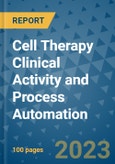Cell therapy has emerged as a promising new approach to treat malignancies that could only be treated on a palliative basis. Among those therapies, chimeric antigen receptor (CAR) modified T cell therapies has proved to be effective for hematological malignancies. To generate CAR T cells, patient- (autologous) or donor-derived (allogeneic) T cells are modified to express a CAR. The CAR is a chimeric construct containing at least one signaling domain of the T cell receptor and a single chain variable fragment (scFv).
The production of autologous CAR T cells is carried out by a variety of manufacturing approaches all comprising the same common steps. First, the patient’s white blood cells (WBCs) are isolated by leukapheresis and washed. Then, the T cells are activated, transduced with the CAR transgene, expanded to the required cell numbers for therapy, formulated and filled. After quality control testing and preparatory lymphodepleting chemotherapy for the patient, the product is injected into the patient.
Table of Contents
1. Executive Summary
- Market Segments
- Competing Technologies
- Bioreactors
- Microcarriers
- Demographics and Growth
- Market Drivers
- Risk Factors
2. Cell Culture Monitoring
- Probe Based Sensors
- Capsule Technology
- Disposable Sensor Patches
- Quality Control
- Technical Challenges
- Electronic Interference
3. Enabling Technology
- Autonomous Sensor Technology
- Wireless Data Transmission
- Analyte Concentration
- Technical Limitations
4. Automated Cell Therapy Manufacturing Platforms
- Next Generation Platforms
- Cell Therapy Process Convergence
- CT Process Standardization
- Robotics
- Market Factors
- Regulations
- FDA
- GMP
5. Company Profiles
Companies Mentioned
- Lonza
- Agilent
- Fujifilm
- Gamma Biosciences
- Codiak Biosciences
- Mitenyi Biotec
- Cesca Therapeutics
- Thermo Fisher Scientific
- Gibco
- UCSF
- FresenusKabi
- Cellares
- Amgen
- AstraZeneca
- Bristol Myers Squibb
- Eli Lilly
- EDM Serono
- Genentech
- Pfizer
- Astellas
- Celltrion
- Daiichi Sankyo
- Genentech
- GlaxoSmithKline
- Imclone
- Janssen Biotech
- Kyowa Kirin
- Merck Sharp Dohme
- Mylan GmbH
- Regeneron Pharmaceuticals
- Samsung Bioepis Co Ltd
- Spectrum Pharms
- United Therapeutics
- Wyeth Pharms
- CliniMACS
- Cytiva
- Zellwerk GmbH
- Wilson Wolf
- Celgene
- Juno Therapeutics
- Novartis Pharma GmbH
- Fraunhofer Institut
- Kite Pharma
- CRISPR








